高考中的交际用语
图片预览

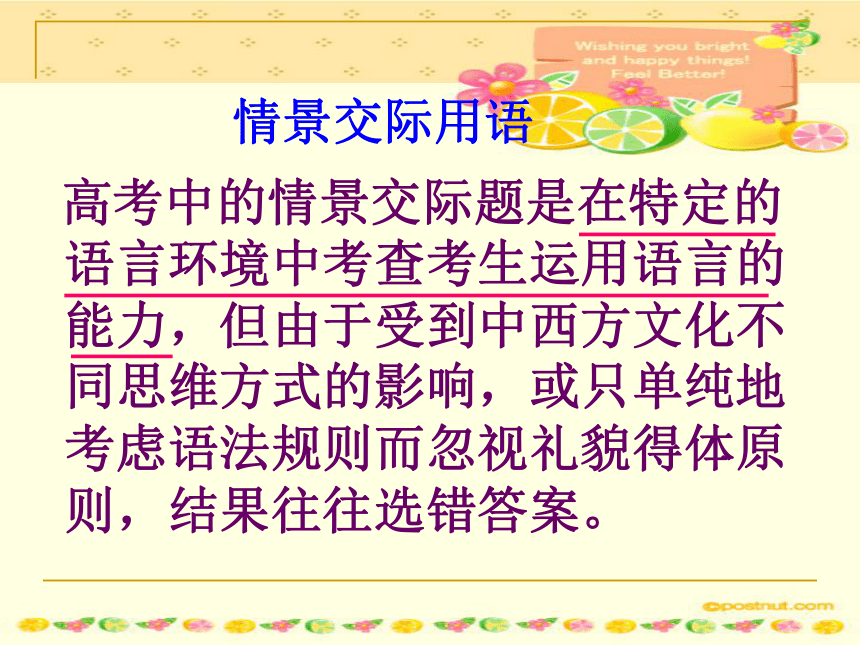
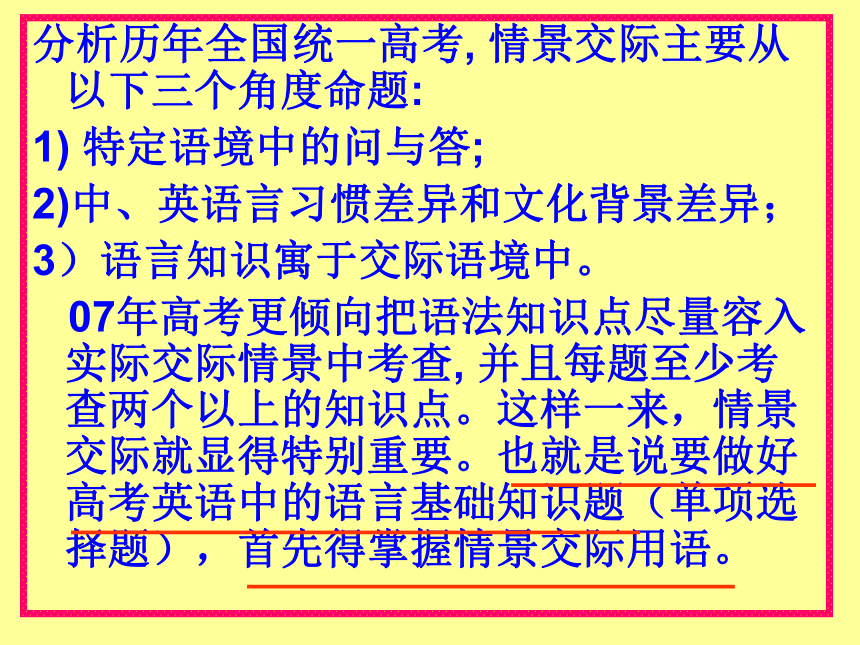

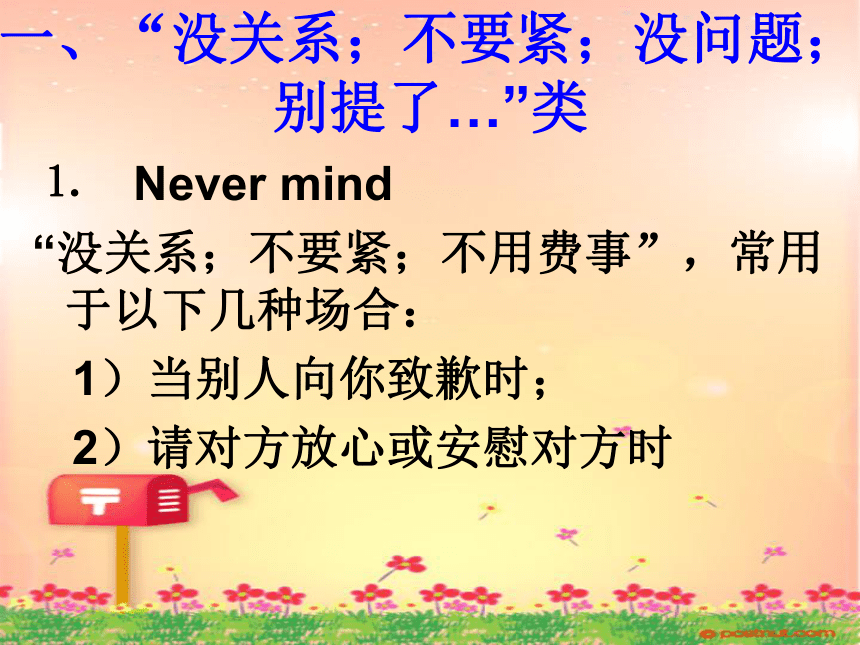

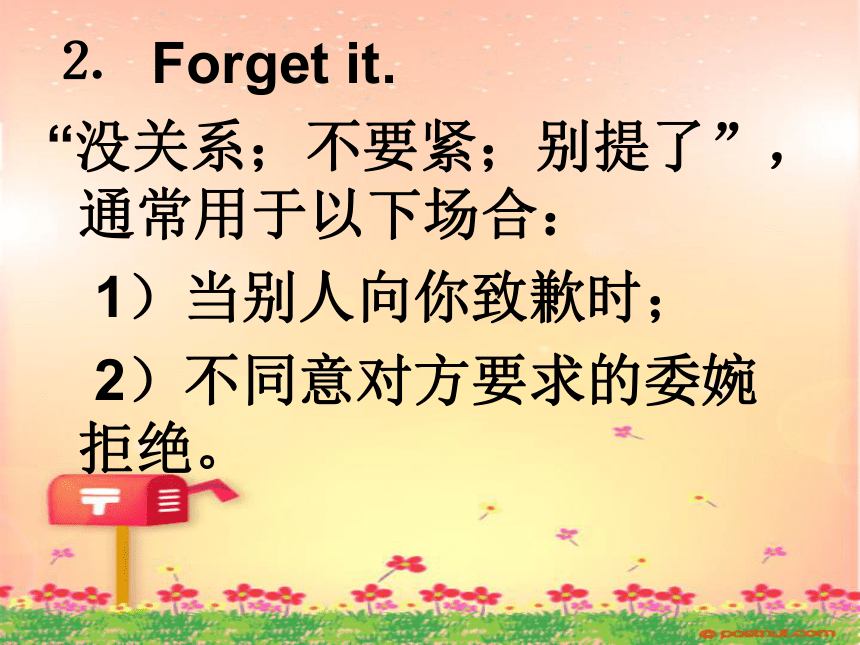
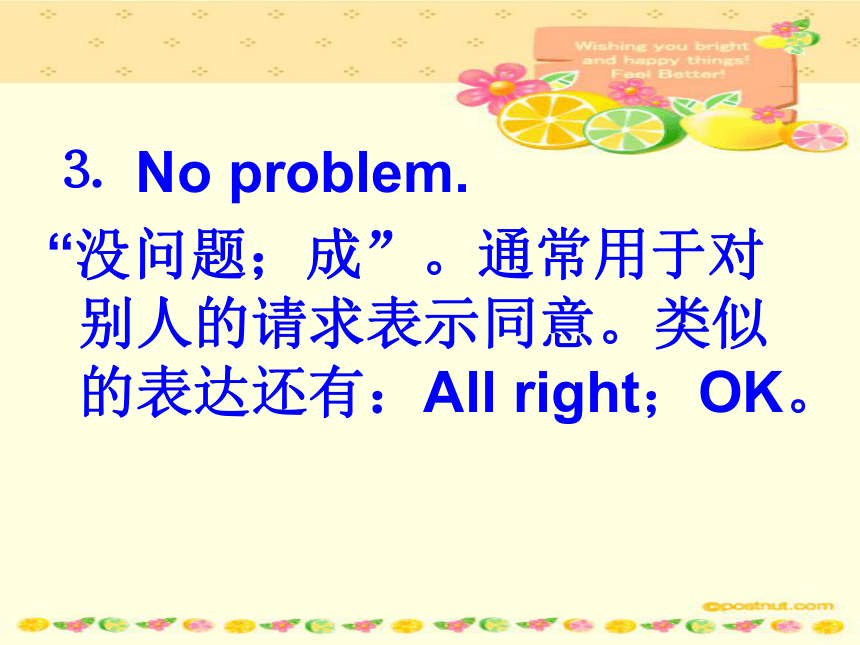
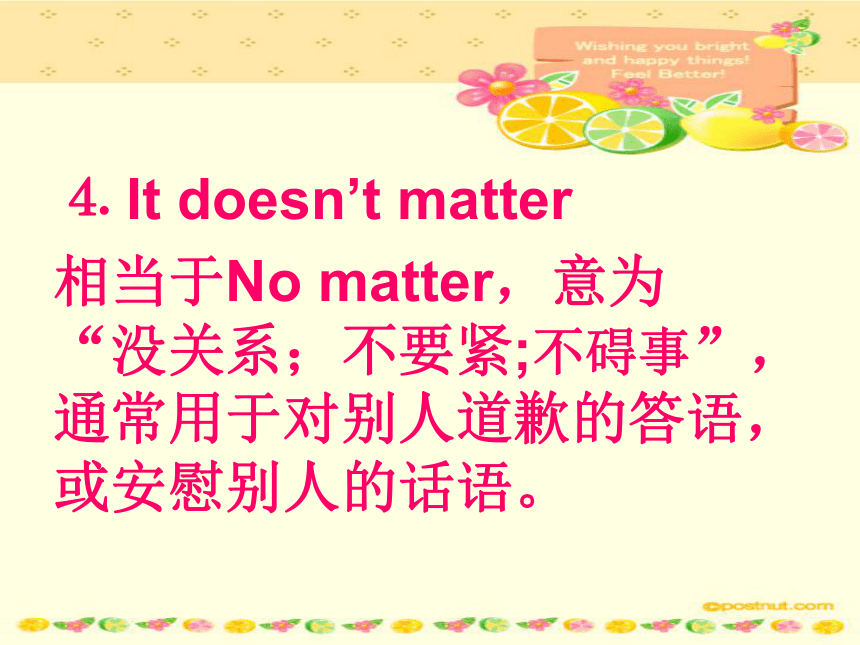
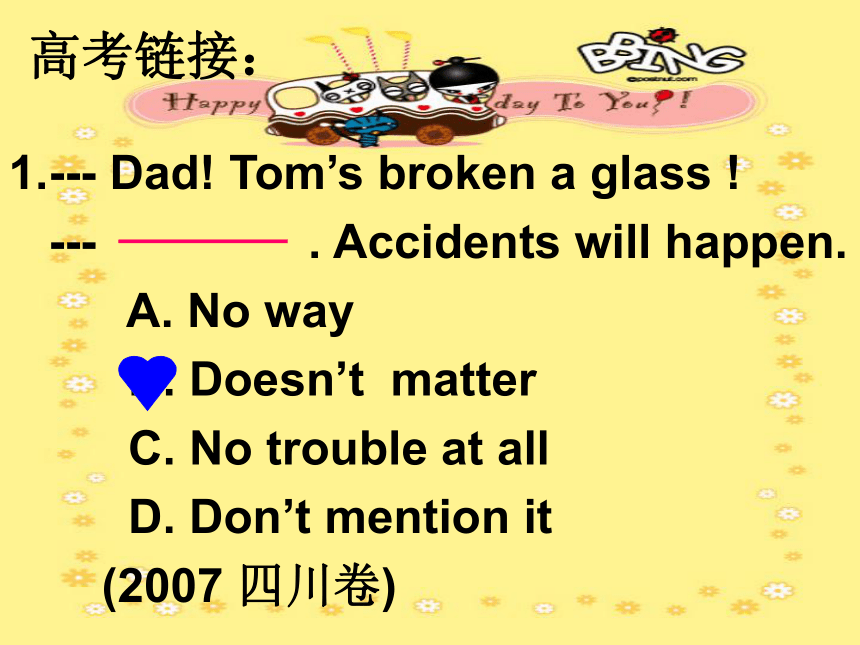
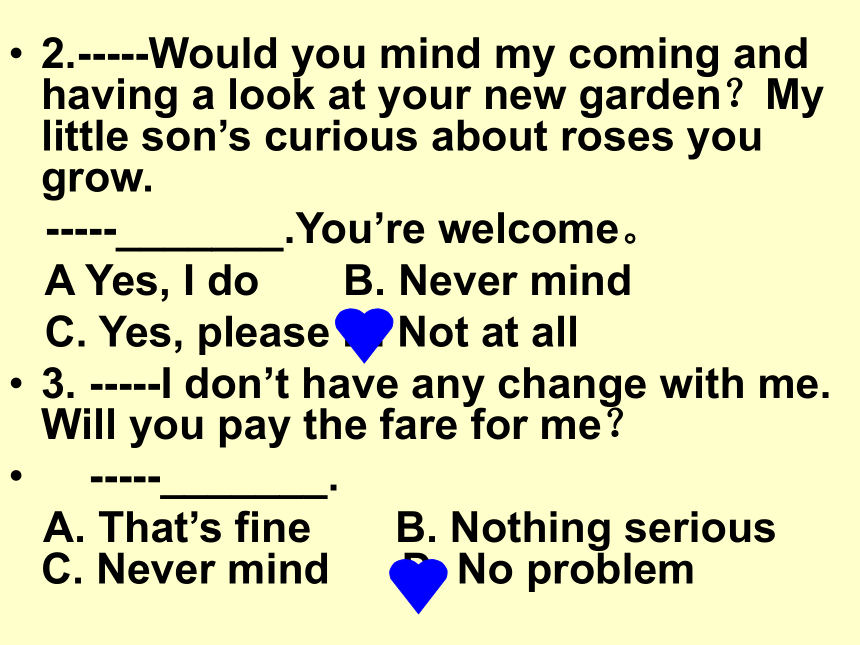
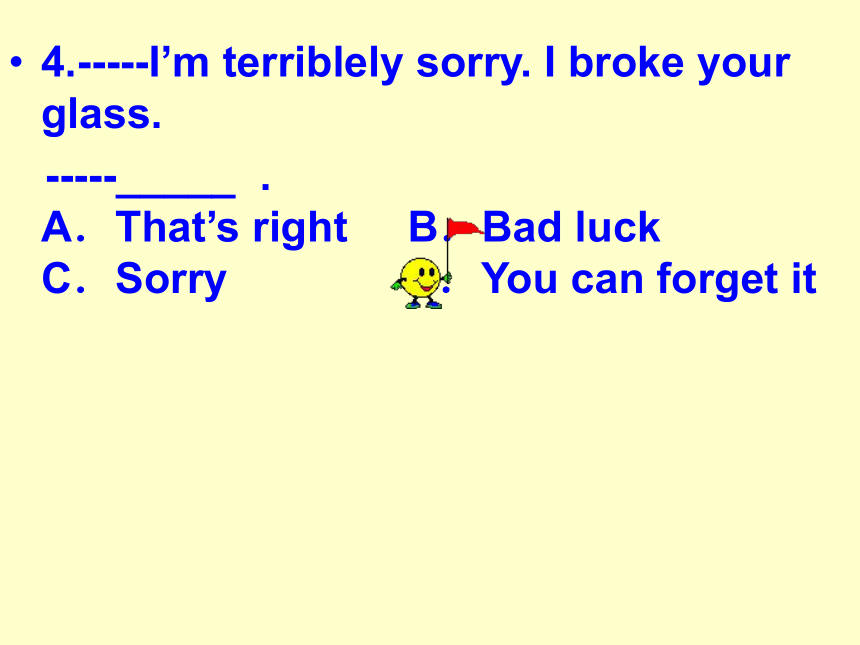
文档简介
课件101张PPT。 高考专题复习情景交际用语 情景交际用语 高考中的情景交际题是在特定的语言环境中考查考生运用语言的能力,但由于受到中西方文化不同思维方式的影响,或只单纯地考虑语法规则而忽视礼貌得体原则,结果往往选错答案。分析历年全国统一高考, 情景交际主要从以下三个角度命题:
1) 特定语境中的问与答;
2)中、英语言习惯差异和文化背景差异;
3)语言知识寓于交际语境中。
07年高考更倾向把语法知识点尽量容入实际交际情景中考查, 并且每题至少考查两个以上的知识点。这样一来,情景交际就显得特别重要。也就是说要做好高考英语中的语言基础知识题(单项选择题),首先得掌握情景交际用语。结合比较历年高考试题,将常见的情景交际用语归纳如下:
一、“没关系;不要紧;没问题; 别提了…”类⒈??? Never mind
“没关系;不要紧;不用费事”,常用于以下几种场合:
1)当别人向你致歉时;
2)请对方放心或安慰对方时
?注意:由于受字面意思的影响,很多学生把Never mind用于对DoWould you mind…的否定回答。对DoWould you mind…表示“不介意”时常用
No, not at all ;Of course not;Certainly not;No, please;
No,go ahead等;表示“介意”的回答为You had better not; I’m afraid…not;I’m sorry,but…等。
⒉ Forget it.
“没关系;不要紧;别提了”,通常用于以下场合:
1)当别人向你致歉时;
2)不同意对方要求的委婉拒绝。⒊ No problem.
“没问题;成”。通常用于对别人的请求表示同意。类似的表达还有:All right;OK。
⒋ It doesn’t matter
相当于No matter,意为“没关系;不要紧;不碍事”,通常用于对别人道歉的答语,或安慰别人的话语。1.--- Dad! Tom’s broken a glass !
--- . Accidents will happen.
A. No way
B. Doesn’t matter
C. No trouble at all
D. Don’t mention it
(2007 四川卷)高考链接:2.-----Would you mind my coming and having a look at your new garden?My little son’s curious about roses you grow.
-----_______.You’re welcome。
A Yes, I do?? B. Never mind ?
C. Yes, please?D. Not at all
3. -----I don’t have any change with me. Will you pay the fare for me?
-----_______.
A. That’s fine? B. Nothing serious C. Never mind?? D. No problem4.-----I’m terriblely sorry. I broke your glass.
-----_____ . A.That’s right B.Bad luck C.Sorry? D.You can forget it二、pleasure类⒈ It’s a pleasure to do “很高兴做…”,相当于PleasedNiceGlad to do.
⒉ It’s a / my pleasure = A pleasure = My pleasure,
“不用谢;没关系;这是我乐意做的”,通常是对thank you 的回答。 3. With pleasure
=YesCertainly
“当然可以;愿意效劳”。 类似的答语还有: All right;OK;No problem;I’d like to等,主要用于对别人的请求表示乐意去做的场合。
高考链接:①-----Could you do me a favor and take these books to my office?
-----Yes,_______
A. for pleasure? B.I could
C.my pleasure?? D.with pleasure
②-----It’s been a wonderful evening. Thank you very much.
? -----_______!
A.My pleasure? B.I’m glad to hear that
C.No, thanks???? D.It’s OK.三、all right 类⒈That’s all right ,“不用谢;没关系”,主要用于对感谢或歉意的礼貌回答。
⒉That’s right ,“对了;正确”,
表示对对方的意见、看法或行为肯定的答复。相反说法为That’s wrong。
⒊All right=OK, ,“行;可以”,
通常用于对对方的建议或请求表示 同意。
对感谢的礼貌回答:
That’s all right;That’s OK;
Not at all;You’re welcome;
Don’t mention it; It is a pleasure A pleasure
My pleasure;
I’m glad you enjoy…等;sb.sth. be all rightOK
“身体好;一切正常”对歉意的礼貌回答:
That’s all right;
It doesn’t matter;
Never mind;
Forget it ;
That’s It’s nothing 等。
高考链接 .-----James,I’m sorry I used your computer when you were away this morning.
-----_______.
A .That’s all right? B.It’s a pleasure
C.You are welcome
D.Don’t mention it四、“祝愿;祝贺”类⒈当听到令人高兴的事时,通常用I’m glad to hear that来应答;
否则用I’m sorry to hear that来应答.
⒉当对方向你表示祝愿时,常用 The same to you 或You,too 来回答。 但对 Happy birthday to you 的回答常用Thank you。⒊当对方在某项活动,如考试、比赛时,向对方表示祝福用Good luck。
⒋当对方在某方面取得成就或成功时,常用Congratulations 来表示。
①??? Tom:Mike,our team will play against the Rocket this weekend. I’m sure we will win. Mike:______. A.Congratulations?? B.Cheers C.Best wishes?????? D.Good luck ② ------I had a really good weekend at my uncle’s. ------_________.
A.Oh,that’s very nice of you B.Congratulation C. It’s?a pleasure D.Oh ,I’m glad to hear that
③-----Have a nice weekend!
-----_______.
A.The same to you?? B.You do too
C .You have it too ????? D.The same as you
④-----I came out first in the English Listening and Speaking Competition.
------_______.
A.Congratulations? B.Good luck
C.Good for you????? D.I’m glad to 五、Go ahead,Help yourself,Here…be类⒈Go ahead
表示鼓励对方做某事, “请吧;请说吧;请开始吧;请尽管用”。
注意:在回答May I use…或I wonder if I can use…时,如借用的东西可以拿走,就用Here you are,反之用Go ahead。⒉Help yourself.
可表示“请随便吃、喝”外,还可表示“请自己动手做…或拿…”。
⒊Here it is.
表示“给你;在这儿”特指上文提到的单数名词。Here they are.
表示“给你;在这儿;他们来了”特指上文提到的是复数名词。
Here you are.
表示“给你;在这儿;你们来到了”,特指上文提到的复数名词,也可以指另外提供的事物。??
Here we are.
表示“这儿有我们所需要的;我们到了”。高考链接:(1)-----Could I ask you a rather personal question?
-----_____.
A Yes,don’t worry?
B.Of course,go ahead
C. Yes,help yourself?
D.Of course,why not
(2)-----Where is my dictionary?
? -----_______.
A.Here they are B.Here we are
C. Here it is
D.Let me have a look六. “come on” 在口语中可以表达哪 些意义?
(1) “come on”: “加把劲、加油” ,相当于“try harder;make an effort”。
(2)“come on” : “快点!赶快” “ hurry up”
(3)有时候也作“cheer up”(振作起来)解;
(4)“come on” :指责对方刚说的话不对,常翻译成“得啦!算啦吧!”。[练一练]
―― It will ____ me at least two hours to do this.
―― Oh, ______! I could do it in 20 minutes.
A.spend; come on B.take; come on
C.cost; don’t mention it D.take; don’t mention it.
七.两个易混的短语
Take it easy! “放松些,别紧张,”
Take your time! “慢慢来,别慌忙,”[练一练] (1).
----I’m afraid I can’t finish the book within this week.
---- _______. You can’t always _____ the deadlines.
A.That’s all right; reach B.Take your time; meet C.Take it easy; meet D.Not at all; reach.(2).-----Why didn’t? Tom come to the party last night?
------I heard he had got a cold.
-----______.
A.Just tell him to take it easy B. What’s the matter?
C.Is that true?
D.What?Where is he ?考点分析及解题策略1中西方文化及思维方式的差异
— Can I speak to Mr Wang, please?
— . (2005全国卷 I )
A. Who are you
B. I’m Wang
C. Speaking
D. Are you John?(2) — It’s getting late. I’m afraid
I must be going now.
— OK. .
(2004全国卷)
A. Take it easy.
B. Go slowly
C. Stay longer
D. See you
(1) —I’m sorry I broke your mirror. — Oh, really? .(NMET,1986)
A. It’s OK with me
B. It doesn’t matter
C. Don’t be sorry.
D. I don’t care
2、注重礼貌和合作优先原则(2)—I’d like to invite you to dinner this Saturday. Mr Smith. — . A. Oh, no. Let’s not B. I’m very sorry, but I have other plans. C. I’d rather stay at home. D. Oh, no. That’ll be too much trouble
( 1 ) — I’d like to take a week’s holiday. — , we’re too busy. (全国卷 III )
A. Don’t worry.
B. Don’t mention it.
C. Forget it
D. Pardon me
3、利用有效的语境因素( 2 ) — Can I look at the menu for a few minutes before I decide?
— Of course . . (2004,四川卷) A. Make yourself at home
B. Enjoy yourself
C. It doesn’t matter
D. Take your time
4、注意语言的衔接(1) —I think George doesn’t really care for TV plays. —Right, he still watches the program. (2004,重庆卷)
A. and B. but C. or D. so(2) No, I’m afraid he isn’t in. This is his secretary speaking. Can I help you ? — . (2004广东卷)
A. Oh, you will.
B. Oh, that’s a pity .
C. I should think so .
D. Well. I look forward to hearing from you.
2) –I think you should phone Jenny and say sorry to her.
-- ______. It was her fault.
A. No way B. Not possible
C. No chance D. Not at all 1. — Do you think our basketballers played very well yesterday?
— _________.
A. They were not nervous at all
B. They were still young
C. They played naturally
D. They couldn’t have done better5.言语含义2. — I think you should phone Jenny and say sorry to her.
— ______. It was her fault.
A. No way
B. Not possible
C. No chance
D. Not at all3 .— Go for a picnic this weekend. Ok? — . I love getting close to nature. (福建2004) A. I couldn’t agree more. B. I’m afraid not C. I believe not
D. I don’t think so.巩固练习⒈-----Give me a bottle of German dark beer and one Scotch beef.
-----Just a moment sir. _____. Ten dollars and fifty-five cent,please
A.Here it is? B.Here you are
C.Here we are? D .Give you this⒉-----Can I have a look at your new car?
-----Certainly,______.
A.please look??
B.It’s too dear
C.it’s very beautiful?
D.go ahead⒊-----Quick!The train is leaving.
-----______.We still have ten minutes left.
A.Never mind? B .My pleasure?
C.All right??????? D.Go ahead
⒋------Merry Christmas and happy New Year!
------________.
A.The same to you? B.Glad to hear that
C.Have a good time?? D.You aren’t sorry ⒌-----Thanks for the lovely party and delicious food.
-----_______.
A.No,thanks??
B.Never mind
C.All right??????
D.My pleasure
⒍-------__________?
-------No,please go ahead.
A.Could you please give me a hand?
B. Shall we go home now
C.Would you like to see a film with me
D.Do you mind if I use your computer for a while
⒎------Shall we go out for a walk after supper?
-----________.
A Help yourself??
B.Go ahead,please
C. That’s right?
D.All right ⒏-----May I have another cake ?
-----Yes,of course.______
A.Please taste quickly B.Have more,please
C. Help yourself
D.Eat slowly while it is hot
⒐------Would you mind if I smoked here?
------_______.Go forward…yeah,at the corner. Yeah,right there
A.Sorry,not here?
B.Yes,I do?
C.Never mind?
D.Of course not
10. ----Can you read the sign ,sir?
No smoking allowed in the lift!
-----
A. Never mind B. Don’t mention it
C. Sure, I don’t smoke
D. Pardon me
(2007全国卷)
Summary: 1.注意中西文化及思维方式的差异。
2.注重礼貌和合作优先原则。
3. 利用有效的语境因素。
4.注意语言的衔接。
5. 注意语言含义。
Thank you !The following exercises are for the next class.11.-----Betty was feeling pretty blue for a while,but she’s better now.
------_______.
A Oh,that’s kind of you B.Congratulations
C. It’s my pleasure D.Oh,I’m glad to hear that
12.-----_____?
-----No,thanks.I’m just looking around.I’ll let you know if I want anything.
A.Have you made up your mind what you want
B.What do you want
C.Can I help D.Do you like it
13.-----Could you make the booking in her name?
------_____.
A.No problem? B.It’s all right
C.Fine????????? D.I hope so 14.-----Could you get the butter out of the fridge?
------______?It’s so noisy that I can’t hear.
A Do you want the money?? B What will you want to do
C.How much????????
D.You what
15.-----I’m sorry,I …I broke your vase,sir.
------______
A.Why ? B.Oh, it’s so precious
C. No matter?
D.I’m sorry too16.-----_______.
-----It’s nothing to worry about. I never liked it anyway.
A.I lost my walkman this morning
B.I feel awful.I’ve got a cold。
C.I feel terrible,but I’ve left your tape somewhere
D.I’m sorry,but we don’t have that medicine17.------What’s happened to my library books?
-----______.
A.I’ve no idea.?
B.You borrowed them from the library
C.You bought them?
D.They’re about wild animals18.-----Why didn’t? Tom come to the party last night?
------I heard he had got a cold.
-----______.
A.Just tell him to take it easy B. What’s the matter?
C.Is that true?
D.What?Where is he ?19.-----I’m so sorry to trouble you so much.
-----______.
A.That’s all right???
B.No,it’s my fault
C.You didn’t hurt me at all?
D . Yes,don’t worry about it20.-----I wonder what the weather will be like tomorrow.
-----______.
A.I don’t like the weather at this time of the year.
B.I don’t mind if it is going to rain tomorrow.
C.Why read the newspaper yourself
D.Let’s listen to the weather report on the radio at ten.21.-----Excuse me,Miss,is this handbag what you
left in the shop?
-----_____.
A.It’s not my fault?
B.Yeah,thank you
C.I’m so sorry .I’m busy?
D. It’s mine!22..-----_______
-----Drop in if you have time.
-----Sure. Bye !
A.Well,I really must be going now.
B.I wonder if you could let me go now.
C.Do you mind if I leave now?
D.What a shame that I want to go now!23.-----It’s too expensive. I need more discount.
-----$1,500,but that’s my last offer.
-----OK,it’s a _____.
A.cost?? B.price??
C.reward??? D.deal24.-----I’m afraid I can’t finish the paper this week.
-----You don’t have to hand it in so quickly._____
A.Please go ahead?
B.That’s right?
C.Not at all????????
D.You can take your time 25.— Now , where is my purse?
— _____, We’ll be late for the picnic. A. Take your time
B. Don’t worry C. come on
D. Take it easy 26.-----Next Monday is my birthday.
-----Is that so ?______
-----Thank you
A.I don’t believe so.?????????
B.I’m so glad
C.What presents do you need??
D.Many happy returns of the day!27.-----Will you please explain this paragraph for me?
-----______
A.No,thanks?
B.It’s OK?
C.With pleasure?
D.I’m glad to hear that 28.-----I really didn’t know how to thank you enough.
------_______
A.No problem
B.Think nothing of it??
C.Not at all????
D..It doesn’t matter
29.-----Hello,is that Mr. Baker speaking ?
-----_____and I’ll transfer for you! He’ll be here in a moment.
A.Hold on?
B.Help yourself?
C.Get through?
D.Hand off 30.-----This is a truly outstanding picture…you have done a great work.
-----Thank you! Thanks for those comments.______
A.Oh,don’t you like it ?
B. That’s all right. I’ll give you a better one next time.
C.I’m glad you like it so much.
D.Oh,you already have the same gift as it.
1.B here you are 在此表示“这是给你的”。
2.D? go ahead在此表示“请吧”;
3. A? never mind 在此相当于don’t worry,表示“不必担心;不要紧”;
4.A? the same to you 相当于I wish you the same,常用于对Merry Christmas等贺词的回答,表示“我也祝你一样”;
5. D? my pleasure 表示“不客气”;
6. D? 对Would you mind…的肯定回答常用No,go ahead或Certainly not;否定回答常用I’m sorry…;
7.D? all right 在此表示“好的”,常用于对对方的建议或请求表示同意;
8.C? help yourself 在此表示“请随便吃”;
9.A? 由下文可知,答话者不希望说话者在此吸烟;
10.C? no matter 在口语中可单独使用,表示“没关系;不要紧”;
11.D? 当听到令人高兴的事时,常用I’m glad to hear that来应答;
12.C? can I help you 常用于向对方提供帮助时;
13.A? no problem 常用于表示很愿意做某事,可意为“没问题”;
14.D? you what 常用于让对方重复前面听说的话;
15.C? that’s a good point 可用于表示“说得对(没想到这一点);所言极是”;答案及注解16.C? 由答语“…反正我也不喜欢它”可知,说话者可能是把答话者的某样东西搞坏了或弄丢了;
17.A? I’ve no idea 表示“我不知道”;
18.A? 由语境可知,此处应用just tell him to take it easy,表示“叫他别担心”;
19.A? That’s all right常用于对歉意或感谢的礼貌回答,表示“没关系;不用谢谢”;
20.D? 由语境可知,答语表示“那让我们来听听收音机上10点的天气预报吧”;
21.B? 当别人帮你找到了你丢失的东西时,通常要说声谢谢;
22.A? 由语意可知,此为道别时用语;
23.D? It’s a deal表示“一言为定;成交”;
24.D? take one’s time表示“慢慢来;不着急”;
25.D? same again表示“同样再来一份”;
26.D? many happy returns(of the day)表示“生日或节日助词,祝您长寿;祝您生日快乐”;
27.C? with pleasure 相当于certainly,意为“当然可以;愿意效劳”;
28.B? think nothing of it 相当于Don’t mention it,表示“不用客气”;
29.A? hold on 在电话用语中表示“请别挂断”;
30.C? I’m glad you like it 表示“很高兴你喜欢它”。16.C? 由答语“…反正我也不喜欢它”可知,说话者可能是把答话者的某样东西搞坏了或弄丢了;
17.A? I’ve no idea 表示“我不知道”;
18.A? 由语境可知,此处应用just tell him to take it easy,表示“叫他别担心”;
19.A? That’s all right常用于对歉意或感谢的礼貌回答,表示“没关系;不用谢谢”;
20.D? 由语境可知,答语表示“那让我们来听听收音机上10点的天气预报吧”;
21.B? 当别人帮你找到了你丢失的东西时,通常要说声谢谢;
22.A? 由语意可知,此为道别时用语;
23.D? It’s a deal表示“一言为定;成交”;
24.D? take one’s time表示“慢慢来;不着急”;
25.D? same again表示“同样再来一份”;
26.D? many happy returns(of the day)表示“祝您长寿;祝您生日快乐”;
27.C? with pleasure 相当于certainly,意为“当然可以;愿意效劳”;
28.B? think nothing of it 相当于Don’t mention it,表示“不用客气”;
29.A? hold on 在电话用语中表示“请别挂断”;
30.C? I’m glad you like it 表示“很高兴你喜欢它”。Thank you !1.— Excuse me, have you been to Japan?
— _______.
A.No, I don’t B.Never C.Sorry, I can’t D.Don’t mention it
2.— My name is Jack Smith. ________
— Hi! I’m Jackson.
A.How do you do?
B.Nice to meet you again.
C.How about you?
D.How are you?3.—Her grandpa passed away yesterday.
— ______ .
A.How do you like it?
B.He was a kind man.
C.Sorry to hear that.
D.What shall we do?4.— Shall we go there next Sunday?
— ________?
— To see the football match.
A.What with B.What by C.What for D.What on
5.—Is there anything I can do for you,sir?
??? —_____ .
A.Perhaps.Go ahead B.No.Take your time
C.Yes.You're welcome
D.Not now.Thanks anyway 6.—Everybody says you are a good student,you never fall asleep in class,do you? —_____ .
A.Yes,sometimes
B.No,I did
C.Yes,never D.Yes,I didn't 7.—Sorry,I can't go camping with you. I have to prepare well enough for the entrance-exam.
—________!We can camp together next time.
A.Don't say so B.Congratulations
C.Good luck
D.No problem
8.—Thank you very much for your wonderful lecture, Mr Bruce!
—________.
A.It doesn't matter B.Don't mention it
C.I'm glad you've enjoyed it D.That's very kind of you to say so9.She told me she hadn't enjoyed the film, but I decided to go and see it _____.
A.after all
B.in all
C.all the same
D.above all
10.—Jenny, I’d like some coffee for a change.
— ______________. It’s in the cupboard.
A.Help yourself
B.Never mind
C.With pleasure D.Change it, please
11.— I’m going to travel to Sydney. Would you please tell me about your experiences there?
— ???????.Let’s discuss it over lunch.
A.Go ahead???
B.It just depends
C.That’s wonderful
D.By all means12.—Shall I begin the lecture?
—I’m afraid we have to wait for a while. John is coming with a microphone.
— . I can do without the microphone.
A.I’m sorry
B.Excuse me
C.I beg your pardon D.Never mind13.—Tom, would you like to come to our dinner party?
— _____.
A.Yes, I would B.Sure, it’s my pleasure
C.No, I can’t come D.Yes, with pleasure
14.—Will he be back by ten tonight?
—No, _____.
A.I think not so B.I’m not afraid C.I’m afraid not D.I don’t hope so
1.答案:B。问话中是现在完成时态。答语应根据选项中的否定意义应该是“从来没去过”。
2.答案:A。根据情景可以看出两个人初次见面的寒暄。“How do do you?”是初次见面时的问候语。
3.答案:C。pass away是die的一种很委婉的说法,故用C。
4.答案:C。这是一种简略问句。原句应为:What shall we go there for?,把与前句相同的部分省略。后面的答语也应当省略“We shall go there”只用不定式短语这个目的状语来回答。
5.答案:D。
6.答案:A。
7.答案:C。good luck 用来表示祝愿幸运。
8.答案:C。用I'm glad that you've enjoyed it说明当自己付出的努力或劳动得到别人认可时, 8.答案:C。用I'm glad that you've enjoyed it说明当自己付出的努力或劳动得到别人认可时,表示感到欣慰。
9.答案:C。考查习惯用语。all the same意为“尽管如此,仍然”。
10.答案:A。
11.答案:D。by all means“(表示同意)当然可以, 没问题”;Go ahead“前进, 有进展; 继续干下去”;It just depends“视情况而定”;That’s wonderful“太好(妙)了”,均不合题意。
12.答案:D。根据空后“I can do without the microphone”可知,此处表“没关系”之意。
13.答案:D。根据习惯和礼貌。With pleasure. “很乐意。”
14.答案:C。根据语境和语意。“我恐怕他不会回来。”15.—— Thanks ______ the lovely party and the delicious food.
—— ________.
A.you; Never mind B.you; All right C.for; With pleasure D.for; My pleasure
16.—— Will you serve me another coffee?
—— ______! Black ____ white?
A.With pleasure; or B.My pleasure; and C.It’s a pleasure; or D.It depends; and17.-----Let’s go shopping first and then go fishing tomorrow。
-----But how will you get there?
-----______.I won’t have the car,will I?
A.Well,come on??? B.You go yourself
C.That’s a good point? D.I’m afraid I don’t agree
18.-----May I take your order ?(15)
-----Yes,I’d like a cup of coffee,a hot dog and some salad. What about you, Lisa?
-----________
A.Give me some advice?
B.Same again,please
C.It’s all the same to me??
D.The same to me
Thank you ! Bye -bye !
1) 特定语境中的问与答;
2)中、英语言习惯差异和文化背景差异;
3)语言知识寓于交际语境中。
07年高考更倾向把语法知识点尽量容入实际交际情景中考查, 并且每题至少考查两个以上的知识点。这样一来,情景交际就显得特别重要。也就是说要做好高考英语中的语言基础知识题(单项选择题),首先得掌握情景交际用语。结合比较历年高考试题,将常见的情景交际用语归纳如下:
一、“没关系;不要紧;没问题; 别提了…”类⒈??? Never mind
“没关系;不要紧;不用费事”,常用于以下几种场合:
1)当别人向你致歉时;
2)请对方放心或安慰对方时
?注意:由于受字面意思的影响,很多学生把Never mind用于对DoWould you mind…的否定回答。对DoWould you mind…表示“不介意”时常用
No, not at all ;Of course not;Certainly not;No, please;
No,go ahead等;表示“介意”的回答为You had better not; I’m afraid…not;I’m sorry,but…等。
⒉ Forget it.
“没关系;不要紧;别提了”,通常用于以下场合:
1)当别人向你致歉时;
2)不同意对方要求的委婉拒绝。⒊ No problem.
“没问题;成”。通常用于对别人的请求表示同意。类似的表达还有:All right;OK。
⒋ It doesn’t matter
相当于No matter,意为“没关系;不要紧;不碍事”,通常用于对别人道歉的答语,或安慰别人的话语。1.--- Dad! Tom’s broken a glass !
--- . Accidents will happen.
A. No way
B. Doesn’t matter
C. No trouble at all
D. Don’t mention it
(2007 四川卷)高考链接:2.-----Would you mind my coming and having a look at your new garden?My little son’s curious about roses you grow.
-----_______.You’re welcome。
A Yes, I do?? B. Never mind ?
C. Yes, please?D. Not at all
3. -----I don’t have any change with me. Will you pay the fare for me?
-----_______.
A. That’s fine? B. Nothing serious C. Never mind?? D. No problem4.-----I’m terriblely sorry. I broke your glass.
-----_____ . A.That’s right B.Bad luck C.Sorry? D.You can forget it二、pleasure类⒈ It’s a pleasure to do “很高兴做…”,相当于PleasedNiceGlad to do.
⒉ It’s a / my pleasure = A pleasure = My pleasure,
“不用谢;没关系;这是我乐意做的”,通常是对thank you 的回答。 3. With pleasure
=YesCertainly
“当然可以;愿意效劳”。 类似的答语还有: All right;OK;No problem;I’d like to等,主要用于对别人的请求表示乐意去做的场合。
高考链接:①-----Could you do me a favor and take these books to my office?
-----Yes,_______
A. for pleasure? B.I could
C.my pleasure?? D.with pleasure
②-----It’s been a wonderful evening. Thank you very much.
? -----_______!
A.My pleasure? B.I’m glad to hear that
C.No, thanks???? D.It’s OK.三、all right 类⒈That’s all right ,“不用谢;没关系”,主要用于对感谢或歉意的礼貌回答。
⒉That’s right ,“对了;正确”,
表示对对方的意见、看法或行为肯定的答复。相反说法为That’s wrong。
⒊All right=OK, ,“行;可以”,
通常用于对对方的建议或请求表示 同意。
对感谢的礼貌回答:
That’s all right;That’s OK;
Not at all;You’re welcome;
Don’t mention it; It is a pleasure A pleasure
My pleasure;
I’m glad you enjoy…等;sb.sth. be all rightOK
“身体好;一切正常”对歉意的礼貌回答:
That’s all right;
It doesn’t matter;
Never mind;
Forget it ;
That’s It’s nothing 等。
高考链接 .-----James,I’m sorry I used your computer when you were away this morning.
-----_______.
A .That’s all right? B.It’s a pleasure
C.You are welcome
D.Don’t mention it四、“祝愿;祝贺”类⒈当听到令人高兴的事时,通常用I’m glad to hear that来应答;
否则用I’m sorry to hear that来应答.
⒉当对方向你表示祝愿时,常用 The same to you 或You,too 来回答。 但对 Happy birthday to you 的回答常用Thank you。⒊当对方在某项活动,如考试、比赛时,向对方表示祝福用Good luck。
⒋当对方在某方面取得成就或成功时,常用Congratulations 来表示。
①??? Tom:Mike,our team will play against the Rocket this weekend. I’m sure we will win. Mike:______. A.Congratulations?? B.Cheers C.Best wishes?????? D.Good luck ② ------I had a really good weekend at my uncle’s. ------_________.
A.Oh,that’s very nice of you B.Congratulation C. It’s?a pleasure D.Oh ,I’m glad to hear that
③-----Have a nice weekend!
-----_______.
A.The same to you?? B.You do too
C .You have it too ????? D.The same as you
④-----I came out first in the English Listening and Speaking Competition.
------_______.
A.Congratulations? B.Good luck
C.Good for you????? D.I’m glad to 五、Go ahead,Help yourself,Here…be类⒈Go ahead
表示鼓励对方做某事, “请吧;请说吧;请开始吧;请尽管用”。
注意:在回答May I use…或I wonder if I can use…时,如借用的东西可以拿走,就用Here you are,反之用Go ahead。⒉Help yourself.
可表示“请随便吃、喝”外,还可表示“请自己动手做…或拿…”。
⒊Here it is.
表示“给你;在这儿”特指上文提到的单数名词。Here they are.
表示“给你;在这儿;他们来了”特指上文提到的是复数名词。
Here you are.
表示“给你;在这儿;你们来到了”,特指上文提到的复数名词,也可以指另外提供的事物。??
Here we are.
表示“这儿有我们所需要的;我们到了”。高考链接:(1)-----Could I ask you a rather personal question?
-----_____.
A Yes,don’t worry?
B.Of course,go ahead
C. Yes,help yourself?
D.Of course,why not
(2)-----Where is my dictionary?
? -----_______.
A.Here they are B.Here we are
C. Here it is
D.Let me have a look六. “come on” 在口语中可以表达哪 些意义?
(1) “come on”: “加把劲、加油” ,相当于“try harder;make an effort”。
(2)“come on” : “快点!赶快” “ hurry up”
(3)有时候也作“cheer up”(振作起来)解;
(4)“come on” :指责对方刚说的话不对,常翻译成“得啦!算啦吧!”。[练一练]
―― It will ____ me at least two hours to do this.
―― Oh, ______! I could do it in 20 minutes.
A.spend; come on B.take; come on
C.cost; don’t mention it D.take; don’t mention it.
七.两个易混的短语
Take it easy! “放松些,别紧张,”
Take your time! “慢慢来,别慌忙,”[练一练] (1).
----I’m afraid I can’t finish the book within this week.
---- _______. You can’t always _____ the deadlines.
A.That’s all right; reach B.Take your time; meet C.Take it easy; meet D.Not at all; reach.(2).-----Why didn’t? Tom come to the party last night?
------I heard he had got a cold.
-----______.
A.Just tell him to take it easy B. What’s the matter?
C.Is that true?
D.What?Where is he ?考点分析及解题策略1中西方文化及思维方式的差异
— Can I speak to Mr Wang, please?
— . (2005全国卷 I )
A. Who are you
B. I’m Wang
C. Speaking
D. Are you John?(2) — It’s getting late. I’m afraid
I must be going now.
— OK. .
(2004全国卷)
A. Take it easy.
B. Go slowly
C. Stay longer
D. See you
(1) —I’m sorry I broke your mirror. — Oh, really? .(NMET,1986)
A. It’s OK with me
B. It doesn’t matter
C. Don’t be sorry.
D. I don’t care
2、注重礼貌和合作优先原则(2)—I’d like to invite you to dinner this Saturday. Mr Smith. — . A. Oh, no. Let’s not B. I’m very sorry, but I have other plans. C. I’d rather stay at home. D. Oh, no. That’ll be too much trouble
( 1 ) — I’d like to take a week’s holiday. — , we’re too busy. (全国卷 III )
A. Don’t worry.
B. Don’t mention it.
C. Forget it
D. Pardon me
3、利用有效的语境因素( 2 ) — Can I look at the menu for a few minutes before I decide?
— Of course . . (2004,四川卷) A. Make yourself at home
B. Enjoy yourself
C. It doesn’t matter
D. Take your time
4、注意语言的衔接(1) —I think George doesn’t really care for TV plays. —Right, he still watches the program. (2004,重庆卷)
A. and B. but C. or D. so(2) No, I’m afraid he isn’t in. This is his secretary speaking. Can I help you ? — . (2004广东卷)
A. Oh, you will.
B. Oh, that’s a pity .
C. I should think so .
D. Well. I look forward to hearing from you.
2) –I think you should phone Jenny and say sorry to her.
-- ______. It was her fault.
A. No way B. Not possible
C. No chance D. Not at all 1. — Do you think our basketballers played very well yesterday?
— _________.
A. They were not nervous at all
B. They were still young
C. They played naturally
D. They couldn’t have done better5.言语含义2. — I think you should phone Jenny and say sorry to her.
— ______. It was her fault.
A. No way
B. Not possible
C. No chance
D. Not at all3 .— Go for a picnic this weekend. Ok? — . I love getting close to nature. (福建2004) A. I couldn’t agree more. B. I’m afraid not C. I believe not
D. I don’t think so.巩固练习⒈-----Give me a bottle of German dark beer and one Scotch beef.
-----Just a moment sir. _____. Ten dollars and fifty-five cent,please
A.Here it is? B.Here you are
C.Here we are? D .Give you this⒉-----Can I have a look at your new car?
-----Certainly,______.
A.please look??
B.It’s too dear
C.it’s very beautiful?
D.go ahead⒊-----Quick!The train is leaving.
-----______.We still have ten minutes left.
A.Never mind? B .My pleasure?
C.All right??????? D.Go ahead
⒋------Merry Christmas and happy New Year!
------________.
A.The same to you? B.Glad to hear that
C.Have a good time?? D.You aren’t sorry ⒌-----Thanks for the lovely party and delicious food.
-----_______.
A.No,thanks??
B.Never mind
C.All right??????
D.My pleasure
⒍-------__________?
-------No,please go ahead.
A.Could you please give me a hand?
B. Shall we go home now
C.Would you like to see a film with me
D.Do you mind if I use your computer for a while
⒎------Shall we go out for a walk after supper?
-----________.
A Help yourself??
B.Go ahead,please
C. That’s right?
D.All right ⒏-----May I have another cake ?
-----Yes,of course.______
A.Please taste quickly B.Have more,please
C. Help yourself
D.Eat slowly while it is hot
⒐------Would you mind if I smoked here?
------_______.Go forward…yeah,at the corner. Yeah,right there
A.Sorry,not here?
B.Yes,I do?
C.Never mind?
D.Of course not
10. ----Can you read the sign ,sir?
No smoking allowed in the lift!
-----
A. Never mind B. Don’t mention it
C. Sure, I don’t smoke
D. Pardon me
(2007全国卷)
Summary: 1.注意中西文化及思维方式的差异。
2.注重礼貌和合作优先原则。
3. 利用有效的语境因素。
4.注意语言的衔接。
5. 注意语言含义。
Thank you !The following exercises are for the next class.11.-----Betty was feeling pretty blue for a while,but she’s better now.
------_______.
A Oh,that’s kind of you B.Congratulations
C. It’s my pleasure D.Oh,I’m glad to hear that
12.-----_____?
-----No,thanks.I’m just looking around.I’ll let you know if I want anything.
A.Have you made up your mind what you want
B.What do you want
C.Can I help D.Do you like it
13.-----Could you make the booking in her name?
------_____.
A.No problem? B.It’s all right
C.Fine????????? D.I hope so 14.-----Could you get the butter out of the fridge?
------______?It’s so noisy that I can’t hear.
A Do you want the money?? B What will you want to do
C.How much????????
D.You what
15.-----I’m sorry,I …I broke your vase,sir.
------______
A.Why ? B.Oh, it’s so precious
C. No matter?
D.I’m sorry too16.-----_______.
-----It’s nothing to worry about. I never liked it anyway.
A.I lost my walkman this morning
B.I feel awful.I’ve got a cold。
C.I feel terrible,but I’ve left your tape somewhere
D.I’m sorry,but we don’t have that medicine17.------What’s happened to my library books?
-----______.
A.I’ve no idea.?
B.You borrowed them from the library
C.You bought them?
D.They’re about wild animals18.-----Why didn’t? Tom come to the party last night?
------I heard he had got a cold.
-----______.
A.Just tell him to take it easy B. What’s the matter?
C.Is that true?
D.What?Where is he ?19.-----I’m so sorry to trouble you so much.
-----______.
A.That’s all right???
B.No,it’s my fault
C.You didn’t hurt me at all?
D . Yes,don’t worry about it20.-----I wonder what the weather will be like tomorrow.
-----______.
A.I don’t like the weather at this time of the year.
B.I don’t mind if it is going to rain tomorrow.
C.Why read the newspaper yourself
D.Let’s listen to the weather report on the radio at ten.21.-----Excuse me,Miss,is this handbag what you
left in the shop?
-----_____.
A.It’s not my fault?
B.Yeah,thank you
C.I’m so sorry .I’m busy?
D. It’s mine!22..-----_______
-----Drop in if you have time.
-----Sure. Bye !
A.Well,I really must be going now.
B.I wonder if you could let me go now.
C.Do you mind if I leave now?
D.What a shame that I want to go now!23.-----It’s too expensive. I need more discount.
-----$1,500,but that’s my last offer.
-----OK,it’s a _____.
A.cost?? B.price??
C.reward??? D.deal24.-----I’m afraid I can’t finish the paper this week.
-----You don’t have to hand it in so quickly._____
A.Please go ahead?
B.That’s right?
C.Not at all????????
D.You can take your time 25.— Now , where is my purse?
— _____, We’ll be late for the picnic. A. Take your time
B. Don’t worry C. come on
D. Take it easy 26.-----Next Monday is my birthday.
-----Is that so ?______
-----Thank you
A.I don’t believe so.?????????
B.I’m so glad
C.What presents do you need??
D.Many happy returns of the day!27.-----Will you please explain this paragraph for me?
-----______
A.No,thanks?
B.It’s OK?
C.With pleasure?
D.I’m glad to hear that 28.-----I really didn’t know how to thank you enough.
------_______
A.No problem
B.Think nothing of it??
C.Not at all????
D..It doesn’t matter
29.-----Hello,is that Mr. Baker speaking ?
-----_____and I’ll transfer for you! He’ll be here in a moment.
A.Hold on?
B.Help yourself?
C.Get through?
D.Hand off 30.-----This is a truly outstanding picture…you have done a great work.
-----Thank you! Thanks for those comments.______
A.Oh,don’t you like it ?
B. That’s all right. I’ll give you a better one next time.
C.I’m glad you like it so much.
D.Oh,you already have the same gift as it.
1.B here you are 在此表示“这是给你的”。
2.D? go ahead在此表示“请吧”;
3. A? never mind 在此相当于don’t worry,表示“不必担心;不要紧”;
4.A? the same to you 相当于I wish you the same,常用于对Merry Christmas等贺词的回答,表示“我也祝你一样”;
5. D? my pleasure 表示“不客气”;
6. D? 对Would you mind…的肯定回答常用No,go ahead或Certainly not;否定回答常用I’m sorry…;
7.D? all right 在此表示“好的”,常用于对对方的建议或请求表示同意;
8.C? help yourself 在此表示“请随便吃”;
9.A? 由下文可知,答话者不希望说话者在此吸烟;
10.C? no matter 在口语中可单独使用,表示“没关系;不要紧”;
11.D? 当听到令人高兴的事时,常用I’m glad to hear that来应答;
12.C? can I help you 常用于向对方提供帮助时;
13.A? no problem 常用于表示很愿意做某事,可意为“没问题”;
14.D? you what 常用于让对方重复前面听说的话;
15.C? that’s a good point 可用于表示“说得对(没想到这一点);所言极是”;答案及注解16.C? 由答语“…反正我也不喜欢它”可知,说话者可能是把答话者的某样东西搞坏了或弄丢了;
17.A? I’ve no idea 表示“我不知道”;
18.A? 由语境可知,此处应用just tell him to take it easy,表示“叫他别担心”;
19.A? That’s all right常用于对歉意或感谢的礼貌回答,表示“没关系;不用谢谢”;
20.D? 由语境可知,答语表示“那让我们来听听收音机上10点的天气预报吧”;
21.B? 当别人帮你找到了你丢失的东西时,通常要说声谢谢;
22.A? 由语意可知,此为道别时用语;
23.D? It’s a deal表示“一言为定;成交”;
24.D? take one’s time表示“慢慢来;不着急”;
25.D? same again表示“同样再来一份”;
26.D? many happy returns(of the day)表示“生日或节日助词,祝您长寿;祝您生日快乐”;
27.C? with pleasure 相当于certainly,意为“当然可以;愿意效劳”;
28.B? think nothing of it 相当于Don’t mention it,表示“不用客气”;
29.A? hold on 在电话用语中表示“请别挂断”;
30.C? I’m glad you like it 表示“很高兴你喜欢它”。16.C? 由答语“…反正我也不喜欢它”可知,说话者可能是把答话者的某样东西搞坏了或弄丢了;
17.A? I’ve no idea 表示“我不知道”;
18.A? 由语境可知,此处应用just tell him to take it easy,表示“叫他别担心”;
19.A? That’s all right常用于对歉意或感谢的礼貌回答,表示“没关系;不用谢谢”;
20.D? 由语境可知,答语表示“那让我们来听听收音机上10点的天气预报吧”;
21.B? 当别人帮你找到了你丢失的东西时,通常要说声谢谢;
22.A? 由语意可知,此为道别时用语;
23.D? It’s a deal表示“一言为定;成交”;
24.D? take one’s time表示“慢慢来;不着急”;
25.D? same again表示“同样再来一份”;
26.D? many happy returns(of the day)表示“祝您长寿;祝您生日快乐”;
27.C? with pleasure 相当于certainly,意为“当然可以;愿意效劳”;
28.B? think nothing of it 相当于Don’t mention it,表示“不用客气”;
29.A? hold on 在电话用语中表示“请别挂断”;
30.C? I’m glad you like it 表示“很高兴你喜欢它”。Thank you !1.— Excuse me, have you been to Japan?
— _______.
A.No, I don’t B.Never C.Sorry, I can’t D.Don’t mention it
2.— My name is Jack Smith. ________
— Hi! I’m Jackson.
A.How do you do?
B.Nice to meet you again.
C.How about you?
D.How are you?3.—Her grandpa passed away yesterday.
— ______ .
A.How do you like it?
B.He was a kind man.
C.Sorry to hear that.
D.What shall we do?4.— Shall we go there next Sunday?
— ________?
— To see the football match.
A.What with B.What by C.What for D.What on
5.—Is there anything I can do for you,sir?
??? —_____ .
A.Perhaps.Go ahead B.No.Take your time
C.Yes.You're welcome
D.Not now.Thanks anyway 6.—Everybody says you are a good student,you never fall asleep in class,do you? —_____ .
A.Yes,sometimes
B.No,I did
C.Yes,never D.Yes,I didn't 7.—Sorry,I can't go camping with you. I have to prepare well enough for the entrance-exam.
—________!We can camp together next time.
A.Don't say so B.Congratulations
C.Good luck
D.No problem
8.—Thank you very much for your wonderful lecture, Mr Bruce!
—________.
A.It doesn't matter B.Don't mention it
C.I'm glad you've enjoyed it D.That's very kind of you to say so9.She told me she hadn't enjoyed the film, but I decided to go and see it _____.
A.after all
B.in all
C.all the same
D.above all
10.—Jenny, I’d like some coffee for a change.
— ______________. It’s in the cupboard.
A.Help yourself
B.Never mind
C.With pleasure D.Change it, please
11.— I’m going to travel to Sydney. Would you please tell me about your experiences there?
— ???????.Let’s discuss it over lunch.
A.Go ahead???
B.It just depends
C.That’s wonderful
D.By all means12.—Shall I begin the lecture?
—I’m afraid we have to wait for a while. John is coming with a microphone.
— . I can do without the microphone.
A.I’m sorry
B.Excuse me
C.I beg your pardon D.Never mind13.—Tom, would you like to come to our dinner party?
— _____.
A.Yes, I would B.Sure, it’s my pleasure
C.No, I can’t come D.Yes, with pleasure
14.—Will he be back by ten tonight?
—No, _____.
A.I think not so B.I’m not afraid C.I’m afraid not D.I don’t hope so
1.答案:B。问话中是现在完成时态。答语应根据选项中的否定意义应该是“从来没去过”。
2.答案:A。根据情景可以看出两个人初次见面的寒暄。“How do do you?”是初次见面时的问候语。
3.答案:C。pass away是die的一种很委婉的说法,故用C。
4.答案:C。这是一种简略问句。原句应为:What shall we go there for?,把与前句相同的部分省略。后面的答语也应当省略“We shall go there”只用不定式短语这个目的状语来回答。
5.答案:D。
6.答案:A。
7.答案:C。good luck 用来表示祝愿幸运。
8.答案:C。用I'm glad that you've enjoyed it说明当自己付出的努力或劳动得到别人认可时, 8.答案:C。用I'm glad that you've enjoyed it说明当自己付出的努力或劳动得到别人认可时,表示感到欣慰。
9.答案:C。考查习惯用语。all the same意为“尽管如此,仍然”。
10.答案:A。
11.答案:D。by all means“(表示同意)当然可以, 没问题”;Go ahead“前进, 有进展; 继续干下去”;It just depends“视情况而定”;That’s wonderful“太好(妙)了”,均不合题意。
12.答案:D。根据空后“I can do without the microphone”可知,此处表“没关系”之意。
13.答案:D。根据习惯和礼貌。With pleasure. “很乐意。”
14.答案:C。根据语境和语意。“我恐怕他不会回来。”15.—— Thanks ______ the lovely party and the delicious food.
—— ________.
A.you; Never mind B.you; All right C.for; With pleasure D.for; My pleasure
16.—— Will you serve me another coffee?
—— ______! Black ____ white?
A.With pleasure; or B.My pleasure; and C.It’s a pleasure; or D.It depends; and17.-----Let’s go shopping first and then go fishing tomorrow。
-----But how will you get there?
-----______.I won’t have the car,will I?
A.Well,come on??? B.You go yourself
C.That’s a good point? D.I’m afraid I don’t agree
18.-----May I take your order ?(15)
-----Yes,I’d like a cup of coffee,a hot dog and some salad. What about you, Lisa?
-----________
A.Give me some advice?
B.Same again,please
C.It’s all the same to me??
D.The same to me
Thank you ! Bye -bye !
